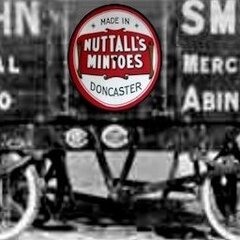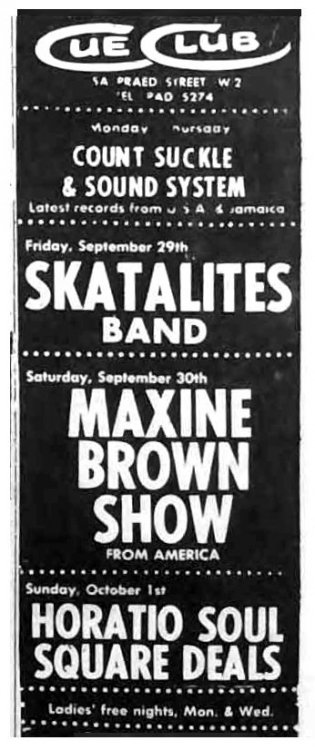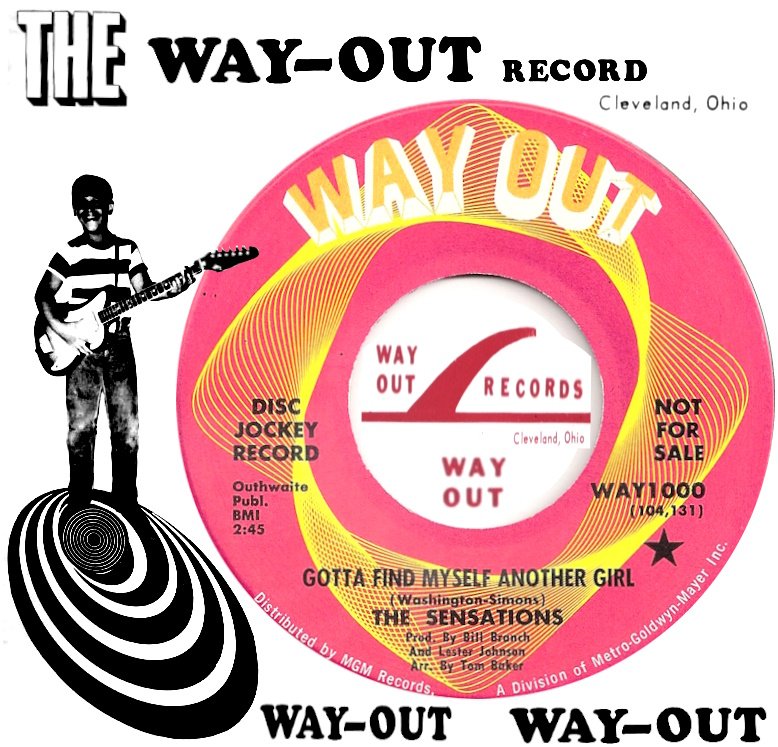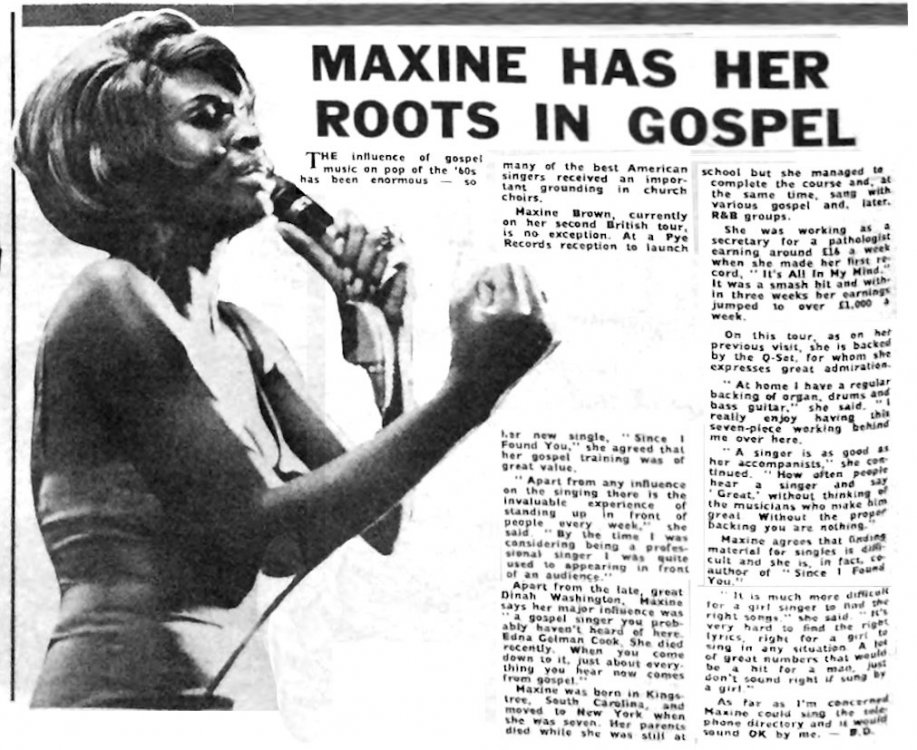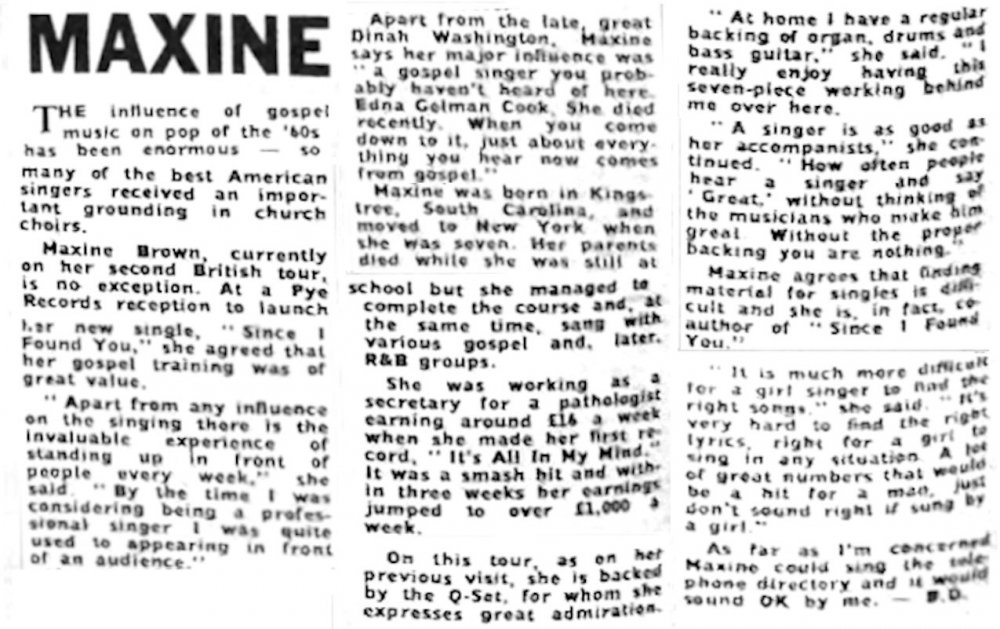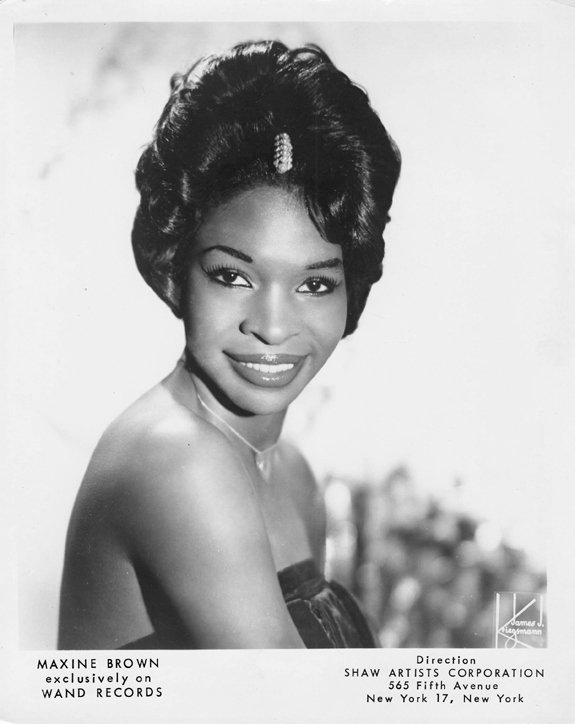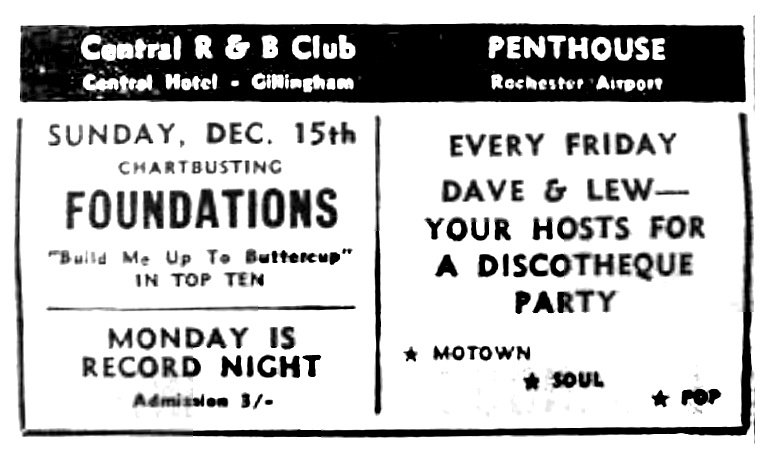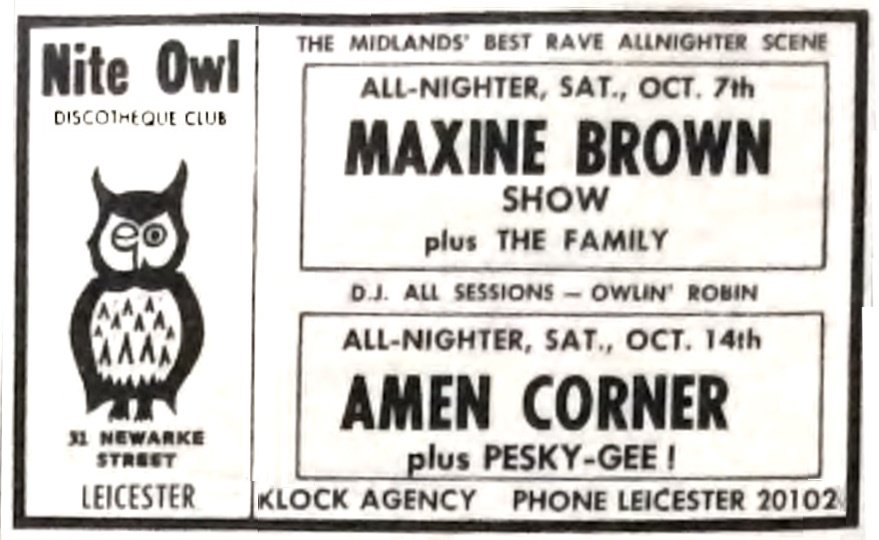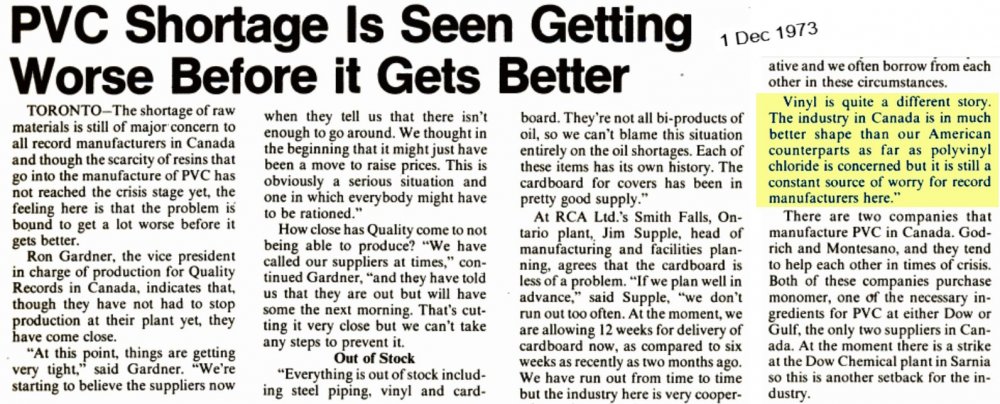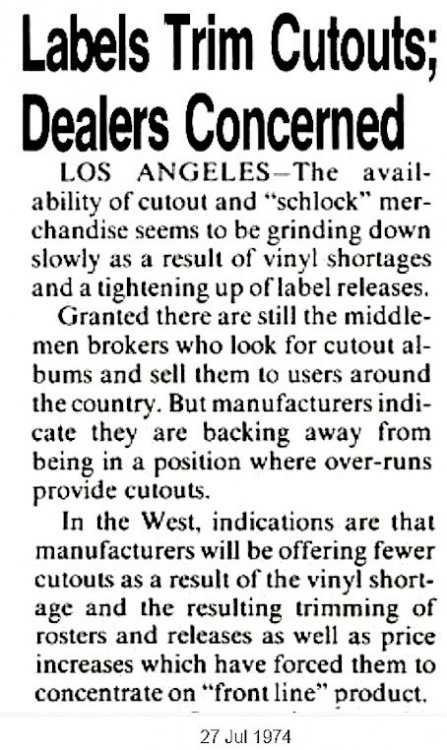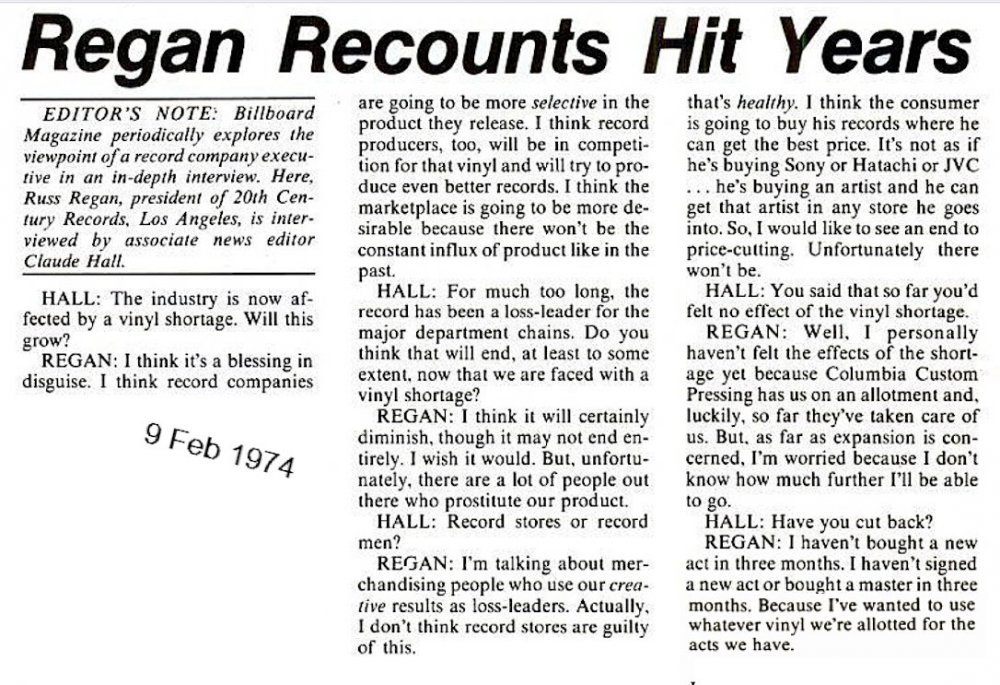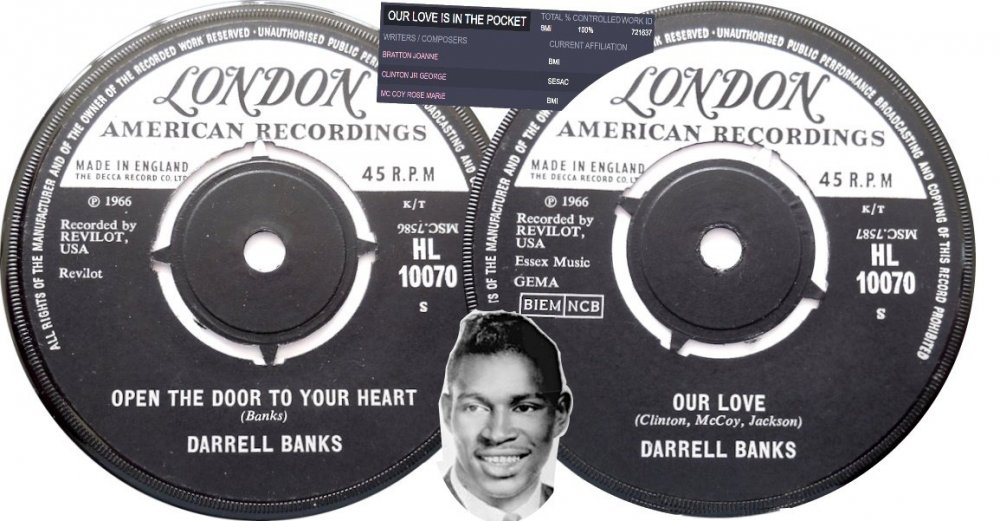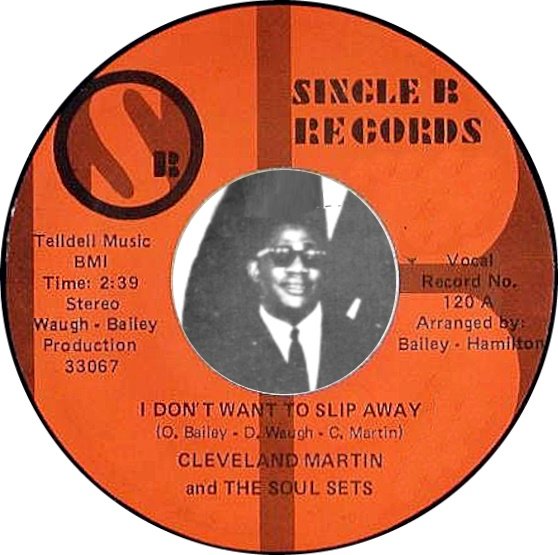Everything posted by Roburt
-
News: Photos: Maxine Brown & the Q-Set at the Central, Gillingham 3rd Dec 1967
An ad for another show on her late 67 tour. It was mainly London clubs catering for black audiences that were still booking lots of black soul / ska acts late in 67 ... this was one such club ...
-
News: Photos: Maxine Brown & the Q-Set at the Central, Gillingham 3rd Dec 1967
Info on both of Maxine's UK tours in 1967 ... https://garagehangover.com/maxine-brown-q-sets-gigs/ When UK student unions still booked the top live acts ... 1967 ...
-
Golden World: Locals & Outsiders Involved
To answer Robbs question from above ... I think that Way Out were trying for a Motown sound on this 45 ...
-
Golden World: Locals & Outsiders Involved
Another Cleveland / Detroit link ... the top Motown & Detroit acts were always playing live dates @ Cleveland venues ... THE MIRACLES @ LEO's CASINO ....
-
News: Photos: Maxine Brown & the Q-Set at the Central, Gillingham 3rd Dec 1967
A UK music mag interview undertaken by Maxine during that tour ... PLUS an ad for a London gig she undertook on the tour ... the changing face of London club live bookings can clearly be seen in the ad (not 100% soul acts anymore) ... EVEN Alan Bown had quit soul & was into his "Toyland" / Outward Bown era.
-
Golden World: Locals & Outsiders Involved
Robb, well the DETROIT SOUND was the sound they were definitely trying to emulate. How close they got to it is hard to quantify but seeing as their studio acoustics were different, their mixing desk was different, their writers, producers, engineer (usually Lou back then), musicians & singers were all different .... I guess it was a thankless task. PLUS building the studio had drained all their cash, so they didn't have the luxury of going for many takes on each song to 'refine the sound' more precisely. It was straight down to recording, wam, bam, thank you man & the tracks were ready for final mixing & release. With regard to Lou & Edwin. Back then they weren't that close, though they knew each other of course. PLUS Edwin wasn't in Detroit much around that time (as discussed earlier on here) -- Edwin was in the UK in September / Oct 66. He returned here to tour again in Jan / Feb / March 67, then again in May / June 67. He was here even more in 1968; 3 tours in all -- Jan / Feb 68 + May / June 68 + Sept / Oct 68 .... He was on at the Wheel in Oct 68 (& during his earlier UK tours) ... In early July 65, Edwin's first 45 had become an instant radio hit (in places such as Baltimore, Cleve, Detroit), so he had to go on the road almost instantly. So he'd returned to Cleve to hire the musicians in his new backing band. Lou knew all the guys who went off with Edwin, but he wasn't one of them himself. Lou R really only hooked up & worked closely in conjunction with Edwin when they were both LA based in the mid 70's. This was before Lou moved on to Vegas & Edwin hit the big time again with "Contact" -- though Edwin had initially hooked up with 20th Century Records via a UK deal he had. It was only after he returned to record in LA with Lamont Dozier, Paul Riser, Hense Powell & H B Barnum that the big hits returned.
-
Golden World: Locals & Outsiders Involved
With Detroit music was the IN THING in the mid 60's, it was obvious other record companies would try to enjoy hits by getting in on Motown's act. Atlantic hooked up with Ollie McLaughlin and were getting hits with Barbara Lewis & the Capitols (who cut their big hit @ Golden World). Amy / Mala / Bell tried with cuts by Gino Washington & Melvin Davis. Chess got hits on Fontella Bass by copying the Motown sound, + they put out loads of other Detroit linked tracks. It isn't a secret that most US record companies were looking to capture that MOTOWN SOUND in the mid to late 60's, in order to get hits from that same rich vein. Companies were using Motown's musicians and signing their ex acts / producers / writers in an effort to get on the train. Over in Cleveland, Way Out Records had been struggling to sell enough of their 45's to stay afloat. They did deals to get national distribution from bigger labels, they took in 'outside money' to fund developments (Jim Brown, the NFL star & his Big Jim label releases in 1967). They wanted their own studio, but wanted the sound in there to have that 'hit magic'. Lou Ragland was a big part of their team at the time (67), but they couldn't fund any 45 releases. So they leased out his tracks to Amy in early 67. They then sent him on a mission to find out how Detroit got THEIR sound. He spent time in Detroit but couldn't get into the Motown studio. He did visit Golden World & United Sound and helped out on some recording sessions there. His most high profile contribution was playing on the backing track to a song titled "If This Is Love (I'd Rather Be Lonely) in early summer 67. He never actually met the group (the Precisions) who got to add their vocals to the track, as they weren't in the studio when the backing track was laid down. With what he had learnt, Lou returned to Cleveland and helped lay out the studio that Way Out had just constructed. They got close to that Detroit sound with some of their recordings, but they never got the big hits they were hoping for.
-
Golden World: Locals & Outsiders Involved
I think all the above + David's SOULFUL DETROIT bits mean just about all (well a very substantial % at the very least) we need to know about how the majority of Detroit's 60's soul recordings came about has been detailed. . . . . now we just have to do the same sort of thing for the 60's Chicago recordings that had major Detroit input. BTW, without the input / info from Robb & David, this thread would be devoid of much of the essential info it contains. Long may they grace us with their presence & data.
-
Little Roger Hatcher meeting over onder Dottys
Roger didn't really seem to be well served by his record companies, but then he could be a very difficult person to deal with. Lots of his recordings down the years have proven to be difficult to get hold of. I guess he pissed off a lot of the bigger recording outfits & so had to make do with little indies & his own labels to get his tracks out. UK Expansion put out a comp album on him many moons ago (The Roger Hatcher Collection) & I was tasked with getting his bio from him to go in the CD release's booklet. To say he was obstructive to my approaches would be an understatement. In the end, Lou Ragland (who knew him) had to read him the riot act to get him to cooperate with my task. I believe Expansion had a few problems in their dealings with him too, after their album was released.
-
Golden World: Locals & Outsiders Involved
David, lots of folk go to those informative pages on the SOULFUL DETROIT archive to learn stuff. The maps & pics on your pages are especially interesting / useful. Just thought that there's some very useful info on this thread that isn't included on your pages + your pages deal with many other bits of info too.
-
News: Photos: Maxine Brown & the Q-Set at the Central, Gillingham 3rd Dec 1967
BTW, I didn't even note down if FAMILY were also on that night. A Leicester group who (like just about all other UK beat groups at the time, played mainly soul covers). They would soon morph, like many other UK groups at the time, into a prog rock group just weeks later. They started having hits in their own right not long after (1968 LP 'Music In A Doll's House'). The Central R&B Club, Gillingham was still going as a soul venue a year later (after many other clubs on the UK circuit had gone over to prog rock / pop acts) ...
-
News: Photos: Maxine Brown & the Q-Set at the Central, Gillingham 3rd Dec 1967
A very interesting piece that captures the spirit of US soul acts touring the UK back in the 60's. The photos included are especially magical. Touring acts played many venues back then that have now largely slipped from the memory. These acts would just about play all the top London soul clubs (the 100 Club wasn't one of those at the time) & they'd also play the niter clubs (Nite Owl, Leicester; Twisted Wheel, Manc). But they'd also play other venues that were regulars on UK's soul circuit -- one of 3 clubs in Nottingham (Dungeon, Brit, Boat Club), Gliderdrome, Boston, Calif, Dunstable, the big venue in Nelson, Bolton & Wigan Casino, one up in the NE (Newcastle or Middlesboro usually), a Portsmouth club (Birdcage) + many more. I also saw Maxine perform on that tour, catching her @ the Nite Owl niter session on October 7th. I kept a diary at the time & just noted down ... Nite Owl; Maxine Brown -- fantastic. One of the best I've ever seen. Had a great night. Gunner (Peterboro) there as well as Scunny, Lincoln lot. Went home via Lincoln, back in Pete's (London) van. Journey made via Barrow-on-Soar (we must have dropped someone off there on the way to Lincoln & then to my home town Donny). It was a fateful weekend, as Sunday midday it was off to the last ever session @ Sheffield's King Mojo (Stevie Wonder being the live act at the alldayer). The Mojo was closed by magistrates the following Tuesday, with the Owl following just weeks later (Dec 4th).
-
Golden World: Locals & Outsiders Involved
With everyone with the right knowledge seeming to comment on this thread, it really does contain some great info. Someone should take down the info posted and turn it into a proper article to go up in the ARTICLES section of the site. That way, it could be used as a source for anyone wanting the definitive details on 1960's Detroit Recording studios / producers and their work.
-
Golden World: Locals & Outsiders Involved
I knew you'd have most of the answers Robb.
-
Golden World: Locals & Outsiders Involved
My main aim when starting up this thread was to discover how many 'out of towners' cut in the Golden World studio. I knew from my contact with Chuck Corby that his group (from Pittsburgh) cut there. But, ascertaining just which local & national 'outside acts (i.e. non GW / Ric Tic / Wingate) cut in the studio isn't an easy task. Obviously the likes of United Sound & Rainbow / Tera Shirma undertook similar work In Detroit for many acts (I believe some GW tracks were even cut @ Tera Shirma & Chuck Jackson cut there too). But which of the local 'little label' acts used GW studios -- I'm thinking of acts who had releases on the likes of Thelma, Velgo, Soulhawk, M-S, Groove City, Groovesville, Revilot, Impact, Drew, D Town, Ashford, Atac, Big Hit, Boo, Carla, De-To, Diamond Jim, Dottys, Inferno, La Beat, Kool Kat, Mahs, Sepia, etc. Are such facts known ?
-
Golden World: Locals & Outsiders Involved
A few Golden World-ers are featured here. What GW cuts mean to us & what UK NS fans mean to them ....
-
Lost 45's -- 1974
A few bits from US music mags that relate to this topic ... the vinyl shortage continued past July 1974 BUT for the big labels (who got the best service from pressing plants), it was mainly LP releases & LP pressing quantities that suffered the most. The likes of 20th Century Records was cutting some releases, not putting out product on lesser selling acts & not signing any new acts. Little indie labels struggled a lot more to get their product (including 45's) pressed up as they required. Which potential releases actually failed to see the light of day is very hard to determine as no record label boss was gonna admit in public that they were cutting product on this or that act. To do so was the surest way to ensure that act got out of it's contract with your company & signed a deal with a new one.
-
Lost 45's -- 1974
Adding further info on the crisis which unfolded very quickly during October 1973. The war kicked off on October 6th. Western countries (US, UK, etc.) soon jumped in to support Israel. On October 17th Arab countries increased the price of their oil & cut production. Nixon was in power in DC but consumed by the Watergate scandal, but he decided helping Israel in the war would distract from Watergate. So he started sending $millions / arms / etc. to Israel. Angered by this, King Faisal of Saudi Arabia retaliated on October 20, placing a total embargo on oil shipments to the United States. He was quickly joined by just about all of the other oil-producing Arab states. By 1973, US oil production had dropped below current consumption, so the US instantly had a shortage. So by the beginning of November 73, it was obvious to anyone using oil / petrol (gas) / petroleum products that things were gonna get tough very quickly & costs were going to shoot up for things like vinyl. This occured right in the pressing plants busiest period of the year (Sept to December -- to meet the Xmas sales rush). WHAT WERE THE PRESSING PLANTS TO DO .... they had multiple existing orders to meet, were quickly using up their existing stock of vinyl, were being quoted increased costs for new product + were warned that supplies would likely run out soon into 1974. It would be great to know what pressing plant bosses decided to do when faced with the above. . . just carry on regardless, meet all current orders in full & face the prospect of having no supply of vinyl left by January 74 ... or did they go back to their (favoured) clients and come up with a joint proposal to reduce the planned numbers of each 45 currently under order. That way, they'd have vinyl left & would be able to press up later releases for those same record companies. I guess they'd go with the later, as if they had 'new releases' available in the initial 3 months of 1974, when many other labels couldn't get their singles pressed ... then they'd get additional publicity for their 1974 releases + increased radio plays (less new 45's being made & therefore less sent out to radio stn DJ's). It also seems likely that they'd plump for a lesser number of promo copies of each new 45 (just enough to service music mags, radio & club DJ's) ... AND THEN ... would only get issue copies pressed up in quantity of those 45's that got good radio audience response. MEANWHILE, no doubt, there were outfits out there seizing the opportunity to make money by pulping unsold warehouse 45 stock, thereby producing recycled vinyl for the pressing plants to buy & use. So not only were some proposed new 45 releases abandoned, but lots of existing soul 45's pressed up over the period between (say) 1969 and 1972 were destroyed. Again, resulting in potential future collector's items being lost completely or being reduced to just a handful of copies remaining. For NS fans, this situation no doubt came about a couple of years too late to have a major effect on their 'rich vein of released singles' but for MS fans it must surely have reduced the number of big sounds that would become available to them.
-
great Northern a-sides with awful b-sides- what's the worse?
Many of the B sides to 45's made by US pop singers are what you'd expect; pop pap. But then, they were only cutting soul flavoured A side tracks coz that genre was 'flavour of the month' through much of the mid to late 60's. So they weren't really soul acts, just opportunists jumping on the bandwagon.
-
Lost 45's -- 1974
I didn't say he did.
-
Golden World: Locals & Outsiders Involved
Prompted by another thread on here (the one on the UK London version of Darrell Banks' classic single), thought I'd add in this bit of info from Sidney Barnes ... (it links to comments from him that I quoted earlier concerning CAN'T SHAKE IT LOOSE by PAT LEWIS) .. Darrell Banks 45's B side is yet another example of 'strange goings on' with regard to publishing credits on Detroit 45's ..... BMI has the writers credits for OUR LOVE IS IN THE POCKET down as being Clinton / McCoy / Joanne Bratton -- the 45's label having the 3rd name as Joanne Jackson). In fact, the song was penned by George Clinton & Sidney Barnes ... not a happy situation for Sidney who states that ... I will forever be pissed about it.
-
Golden World: Locals & Outsiders Involved
Lots of other 'outside artists' cut @ Golden World. One of those being Rufus Wonder & the Additions. The Additions (aka the Editions) were teamed with Rufus for the session that resulted in their Lando 45. They originally undertook the cutting of Rufus's songs at United Sound (65) but that session didn't work out. So a few days later they went into Golden World studios and re-cut "Under The Moon" (info ascertained by Boba in an interview & by David Flynn). Is it known which Detroit studio the other Lando cuts were recorded in ? Rufus stated that he & the Additions sang backing vocals on Carl Carlton's "I Love Only You" (for Lando). Edd Henry the song's writer also cut the song (for Lando sub label Nu-Sound). No idea if Rufus sang on that version as well. Don't think it's mentioned which studio either of those sessions were undertaken at.
-
Chuck Corby And Rhythm Rascals
. . . . so Chuck approached the Sinceres and they agreed to go into the studio with him. For the purposes of the session and the subsequent 45 release, they were renamed the Soul Communicaters (Cleveland Martin being one of their members). To save money, Joe Averbach took two already recorded backing tracks and had Chuck pen new lyrics for both. The original cuts had been put out as by the Rhythm Rascals (Cleveland Martin once again being a member). Thus “Please Don't Go” and “Those Lonely Nights” were laid down by Chuck and the Sinceres / the Soul Communicaters in Tower Studio (New York) under the direction of Teacho Wilsure (the drummer on the session being Bernard 'Pretty' Purdie). The record was put out in Pittsburgh but failed to really register there. However, it did fare a lot better in Ohio and across southern states. Eventually copies of the single would be found by British soul fans and the B side would become a big Northern Soul sound. Much later (2005) German dance music producer Frank Popp put out "Breakaway" a song that samples "Those Lonely Nights". Chuck not knowing any of this, just moved on with his career .... BY THE WAY ... Joe Averbatch had been responsible for both the Dell-Vikings and Chuck Jackson's early successes. He was also the guy who sent Chuck to New York to record alternative versions of the two songs he & his group had laid down @ Golden World's studio . For that session, Chuck had to quickly pull together a new backing line-up and dubbed them the Chances. In New York, the new line-up cut revised versions of “Man Loves Two” & “Happy Go Lucky” (Sound / Veep). Another 45 that Cleveland Martin was on ...
-
Lost 45's -- 1974
Was the Carstairs 45 one that suffered due to the vinyl shortage or was it just coz Chess was going thru hard times generally & was 'pulling back' ? When Red Coach lost their Chess Records /GRT distribution in 1973, the 45's release was pulled after the promo stage. Gene Redd later issued the record himself via his own Red Coach/Red-Lite Records set-up, but that was well after the vinyl shortage was over.
-
Lost 45's -- 1974
In Jamaica, they always used recycled vinyl .. including bits of old paper labels just to add extra rubbish into the mix. It's also said that they'd sweep the pressing plant floor & all that rubbish would also go in the vinyl bin.

